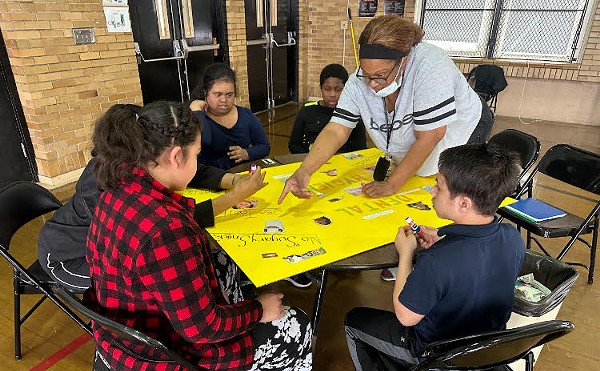Corrections, Amendments and Clarifications
Mazzoni’s, which recently moved to 12003 Shelbyville Road, was left out of last week’s Dining Guide. Also, Gelato Gilberto is located at 9434 Norton Commons Blvd.
Participatory Debate
Thank you to Francene for her recent column on the lack of candidate participation in forums and debates during this election season (LEO Weekly, Oct. 22). For many years, KET has provided the only means for a statewide audience to hear directly from candidates for major offices, without the filter of commercial media, editorial interpretation or advertising agencies. We believe this is an important part of the political process and a service many in the commonwealth rely on in order to better know and understand the candidates they will select to represent their values and best interests.
There is one point in the column that deserves clarification. The contention that Republican Congressman Ed Whitfield’s claim to equal opportunity was invalid due to an exemption for debates and forums cannot be used in this particular case. While Francene is correct in citing that this exemption exists within the FCC rules, it actually could not be applied to this situation. After consulting with expert legal counsel on broadcast law, we learned that once there is only a single candidate participating, in this case the challenger in the 1st District congressional race, the program no longer meets the legal definition of a “debate” or “forum.” Thus, equal opportunity could be invoked, and KET had no choice but to comply.
But, to Francene’s primary purpose in the column, this never would have been an issue had both candidates simply participated.
Kentuckians rely on KET’s candidate forums in order to be better informed on Election Day. And this important service is most valuable when all the candidates participate.
Shae Hopkins, KET Deputy Executive Director, Louisville
Primal Whining
Attn: Joe Manning:
While I agree with almost everything you stated in your guest commentary (LEO Weekly, Oct. 22), I believe we’re missing some underlying assumptions being made here. I firmly agree that the word “deserve” is almost meaningless. We aren’t “owed” (another questionable word) anything for being human, but the root of the problem still lies in our human nature.
I don’t enjoy listening to someone whine anymore than the next person, no matter how much I may care about them. I’m sure we all are at one time or another disgusted at one another and ourselves for our own will to whine. But I believe we need to step back and look at the broader scope of things. When your brother comes to you complaining about his low-paying job and how it’s not fair that he won’t be able to get that huge plasma TV in time for the Super Bowl, look for what he means, not what he’s saying. Maybe what he actually means is, “I want to create a place for the ones I care about, my friends and family, to come together, and because I’ve been conditioned to consume, I think I need to pacify people with goods to gain their acceptance.”
We all, as humans, have needs. Over the last 3 million years, we lived in very close-knit tribes where we came to need and expect the safety, security and support that tribe provided. Since the agricultural revolution, we’ve slowly drifted away from that, but it doesn’t mean it’s not what we need. We can’t and don’t want to go back to living in caves and using bows and arrows, but we can have compassion for one another and turn from our consumer-crazed lives to truly interact with one another and our community.
So as far as all-men-created-equal, etc. — ideas are nice, but they are just ideas. They aren’t natural laws. But needs are natural laws, so the next time we find ourselves disgusted at our fellow human beings or ourselves, let’s look beyond the whining and see the need that’s trying to be expressed.
Shane Ashford, Louisville
Make Room for Arena
Prior to retiring in May, I was the director of sales and marketing for the Kentucky State Fair Board and was fortunate enough to have some input into the new Louisville Arena’s event numbers. After reading Sarah Kelley’s City Strobe interview with Jim Host (LEO Weekly, Oct. 8) and seeing Cleveland’s Mark Rosentraub’s comments about the number of events at the new arena, I felt compelled to write. Kelley neglected to acknowledge and Rosentraub may not have been aware that Freedom Hall will continue to operate and host events even after the new arena is built. Comparing Cleveland’s single Quicken Loans arena to Louisville’s new arena, which will split our market’s arena events with Freedom Hall, is unfair. Even as a smaller market without the 41 dates the NBA brings to Cleveland, Louisville is projected to host more than 200 events between the two buildings, similar to Cleveland’s. Add the potential renovation of the 6,000-seat Louisville Gardens, and our event numbers will be split even more among the arenas.
My admiration abounds for Host and the Arena Authority, along with Harold Workman, the Fair Board CEO. The hours they have spent studying the unending details of the TIF and design rivals that of the bridges project at a fourth of the time. However, another key to the new arena’s success will be to grow the Louisville-arena event pie. The burgeoning number of arenas worldwide certainly split the event pie even thinner, creating a buyer’s market. For Louisville, it will take major dollars it currently struggles to find to pay rights fees, create promoter incentives and make outright purchases, risking capital to increase the standard fare of events.
Entities like the U of L Athletic Association and Jonathan Blue’s BEST can be counted on to be avid proponents and creators of new events at the new arena, but they will be limited in what they can do without the financial support of the community. The arena opens in two years. A solid financial plan for event funding is just as integral to the success of the arena as the design or the TIF.
Deborah Burda, Louisville
Pass on Pretension
I thoroughly enjoyed Paul Kopasz’s Sept. 17 review in LEO Weekly of Robert Schlesinger’s “White House Ghosts: Presidents and Their Speechwriters.” He posits that Schlesinger’s book suffers from a dry, overblown style, an opinion that I can well understand, having seen Schlesinger’s interview of esteemed JFK speechwriter Theodore Sorensen on CSPAN2’s “BookTV” last June. The interview concerned a book Sorensen had recently written — “Counselor: A Life on the Edge of History.” Sorensen was JFK’s alter ego, and he explained to Schlesinger how he had come to know what JFK wanted to say, having worked closely with him from 1953 until Nov. 22, 1963; how JFK would review a speech and insert his own phrases, and how others contributed. During the interview, Schlesinger asked Sorensen whether he utilized an “iterative process” in the forming of his speeches. After asking Schlesinger to repeat the question, Sorensen replied, “Iterative process is not a phrase used by Nebraskans.” Sorensen is from Nebraska. His book is one I’d like to read. I’ll pass on Schlesinger’s.
Rick Cushing, New Albany





